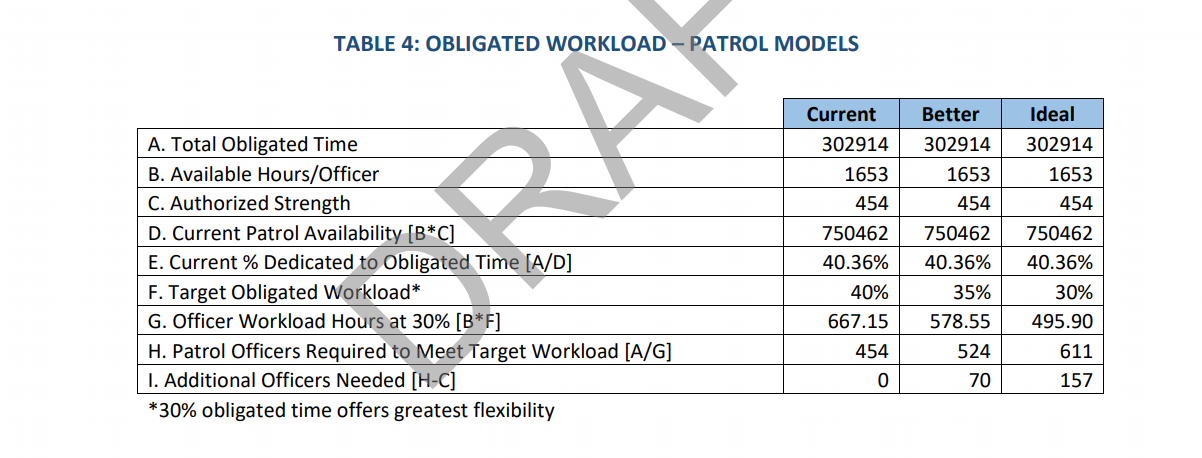Inside the LBPD Assessment Recently Unsealed by a Federal Court
8 minute readAfter a week of legal wrangling over a protective order, a federal court on Friday unsealed an evaluation of the Long Beach Police Department put together by a team of consultants in 2018.
The assessment had been shrouded in mystery since the project was abruptly cancelled two years ago, just as it was being finalized. The city paid half of the $96,000 bill before severing its contract with the IACP, blaming the nonprofit for project delays. City Manager Tom Modica has maintained that city officials did not review the report before the plug was pulled, but emails show that police brass received a presentation on preliminary findings before the project was cancelled.
Attention was brought to the report once again after it was subpoenaed from the IACP earlier this year in a civil lawsuit against the city alleging police misconduct, but was placed under seal.
There had been growing pressure on the city from activists and some members of the media since then to make the report public amid a growing Black Lives Matter movement demanding police accountability and transparency. Beachcomber Columnist Stephen Downing, who has been spearheading the effort to wrest the document from obscurity, broke the news on Friday that the IACP study had been made public.
In a statement released hours later, the city said that it requested the protective order be lifted “in alignment with the City’s ongoing commitment to be fully transparent to requests to see the report.”
FINDINGS AND RECOMMENDATIONS
It’s important to note that IACP consultants approached this assessment through the lens of optimizing the LBPD through reform, and not defunding or dismantling the department, as protesters have demanded in the wake of George Floyd’s death at the hands of Minneapolis police.
One of the main findings in the 124-page study, which is in draft form and dated November 2018, is that the LBPD lacked policies in certain key areas, including officers’ interactions with LGBTQ people, off-duty conduct, and biased-based policing.
In addition, IACP researchers found that the department policy manual lacked adequate guidance on how officers should lawfully conduct a search. More broadly, evaluators found that “notable areas for improvement include establishing a clear Mission, Vision and core values.”
On the topic of police accountability, the consultants recommended that the LBPD assign two new investigators to Internal Affairs, develop a graduated discipline matrix, and create an early warning system to alert leadership of problematic officers so that proactive intervention can be administered.
Last month, LBPD Chief Robert Luna told the City Council that the department was working on such a system. In its statement, the city said that some of the IACP’s recommendations have already been implemented. This is apparent in the police department’s use-of-force policy, updated early this year to include language about the sanctity of life while emphasizing the use of deescalation techniques, two other IACP recommendations.
Civil Rights Attorney Shirin Buckman, who attempted to subpoena the IACP study prior to the document being made public, said she was disappointed by the narrow scope of the consultants’ evaluation when it came to how the department holds officers accountable for misconduct.
“Although the IACP’s recommendation to develop a ‘discipline matrix’ is a good start, it is disappointing that the Study did not call for an independent and unbiased Internal Affairs process that ensures disciplinary action for unsavory officers who have a long rap sheet of Internal Affairs complaints against them,” she said in an email. “Restoring an Early Warning System can only be effective if there are independent and unbiased processes that will ensure officer accountability.”
Buckman is currently representing a Black couple alleging that they were racially profiled in 2017 while trying to board the Metro Blue Line by LBPD officers who were conducting fare enforcement. One defendant, Michael Hill, was cited while his partner, Kathleen Williams, was arrested for two days, during which time she says she was fed rotten food and slept in a cell with blood on the walls.
The lawsuit made headlines in recent days after U.S. District Judge Andre Birrotte Jr. granted a motion making LBPD Chief Robert Luna a defendant in the case. He wrote that the move could potentially make Luna “personally liable for his role in promulgating, maintaining, and encouraging the Long Beach Police Department’s (“LBPD”) policies and practices that resulted in the alleged constitutional violations carried out against plaintiffs on the Metro Blue Line.”
The IACP also suggested that the police department publicly post Internal Affairs (IA) reports on its website and “compare the findings of the (Citizen Police Complaint Commission) to their own internal investigations. Inconsistent findings should be further examined to explain the disparities.”
The report’s findings and recommendations are organized into six pillars that “highlight the commonly accepted 21st century best practices” for policing:
Tomisin Oluwole
Face the Music, 2022
Acrylic on canvas
24 x 36 inches
Click here to check out our interview with Tomisin Oluwole, a literary and visual artist based in Long Beach.

Instead of gunking up our site with ads, we use this space to display and promote the work of local artists.
- Building Trust and Legitimacy
- Policy and Oversight
- Technology and Social Media
- Community Policing and Crime Reduction
- Training and Education
- Officer Wellness and Safety
An internal survey asking LBPD command staff to score how the department was doing in these six areas resulted in mostly lackluster grades, particularly poor in the categories of “Training and Education” and “Technology and Social Media,” which came in below 70%.

Excerpt from the “IACP Operations & Management Study of the Long Beach Police Department.”
According to the study, some of the questions around training and education consisted of whether “officers had clear direction regarding use of force and use-of-force reporting, so that minimal force, deconfliction, and safety of residents and officers remain paramount in all situations.”
Another of the researchers’ findings was that an officer’s field training and probationary period overlap and end at the same time. That means there is no “mechanism to evaluate how new officers will perform in solo status without support and oversight from (field training officer) before they complete probation.”
The IACP found that the department’s rank-in-file perceived “traditional police practices … as the guiding model, instead of the community focused approach stated in the agency’s mission and vision.” Instead, the consultants advised that the LBPD should make “community policing part of each officer’s responsibility.”
While community policing has been hailed as a more enlightened policing strategy, the practice has come under criticism by some as being mostly ineffective.
Other places the LBPD could improve, according to the IACP, were in its recruiting, crime clearance rate, use of intelligence, records management, and internal communication,
NO LGBTQ POLICIES
The revelation that the LBPD did not have any policies addressing police interactions with LGBTQ individuals drew ire from Franklin Sims, who is leading the charge to recall Mayor Robert Garcia.
In a video posted to Instagram Friday afternoon, he said, “It’s despicable that (Garcia) would be in office this long, six years, an openly gay man, married—he should know the struggles of the gay community—and he’s going to take money from the police (union) and then they don’t have any policies?”
We reached out to the Mayor’s Office for a response but have yet to hear back. In his official response to the recall campaign, Garcia said he “received a perfect score from the Human Rights Campaign for LGBTQ inclusion.”
Long Beach, along with San Francisco, were the only cities in the state to receive a perfect score. The scorecard indicates that Long Beach has an LGBTQ Police Liaison or Task Force, yet one of the IACP’s recommendations is that the LBPD institute an LGBTQ liaison.
A spokesperson for the LBPD told us that the department would not be commenting on the IACP report independent of the city’s statement issued Friday. A review of the department’s policies posted online shows that it has not implemented any LGBTQ-specific policies since the report was created as was recommended by the IACP. Additionally, the department’s Gay and Lesbian Advisory Committee to the Chief is no longer active, said LBPD spokesperson Arantxa Chavarria.
The LBPD has a sordid history of harassing the LGBTQ community, including a longstanding practice of using undercover officers to entrap gay men until it was struck down by the courts in 2016. The practice was still in place while Garcia was in office, and when the historic ruling came down, he did not issue any public comments about it.
The city estimates that there are about 80,000 LGBTQ residents in Long Beach.
“Few police departments have policies governing their interactions with people who are LGBTQ or non-binary, and homophobia and transphobia are rampant within police departments,” the National LGBT/HIV Criminal Justice Working Group said last year.
You can view the full report below or download it here. This story is breaking and will be updated.
This story was updated at 5:30 p.m. 7/26/20.


 kevin@forthe.org
kevin@forthe.org @reporterkflores
@reporterkflores




